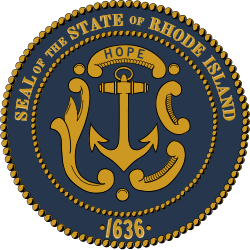Delegate breakdown
The Rhode Island Democratic Party sent a total of 32 delegates to the 2008 Democratic National Convention. Of those delegates, 21 were pledged, and 11 were unpledged. All of the 21 pledged delegates were allocated (pledged) to vote for a particular candidate at the National Convention according to the results of the Rhode Island Presidential Primary. The 11 unpledged delegates were popularly called "superdelegates" because their vote represented their personal decisions, whereas the regular delegates' votes represented the collective decision of many voters. The superdelegates were free to vote for any candidate at the National Convention and were selected by the Rhode Island Democratic Party's officials. [1] [2]
The 21 pledged delegates were further divided into 13 district delegates and 8 statewide delegates. The 13 district delegates were divided among Rhode Island's 19 Congressional Districts and were allocated to the presidential candidates based on the primary results in each District. Congressional District 1 chose 6 delegates and Congressional District 2 chose 7 delegates. The 8 statewide delegates were divided into 5 at-large delegates and 3 Party Leaders and Elected Officials (abbreviated PLEOs). They were allocated to the presidential candidates based on the primary results statewide.
Of the 11 unpledged delegates, 10 were selected in advance and 1 was selected at the State Executive Committee meeting on June 19, 2008. The delegates selected in advance were 6 Democratic National Committee members; the two Democratic U.S. Representatives from Rhode Island, Patrick J. Kennedy (District 1) and James Langevin (District 2); and both Democratic U.S. senators from Rhode Island, Jack Reed and Sheldon Whitehouse. [3] [4]
Polling
On March 2, 2008, the most recent opinion polling of likely Democratic Primary participants showed Senator Clinton leading her opponent, Senator Barack Obama, 42% to 37%, with 22% undecided. [5]
Among Rhode Island's 11 superdelegates, ten had endorsed a candidate by February 2. Eight had announced support for Senator Hillary Clinton, and two had committed to Senator Barack Obama. [6]
This page is based on this
Wikipedia article Text is available under the
CC BY-SA 4.0 license; additional terms may apply.
Images, videos and audio are available under their respective licenses.




